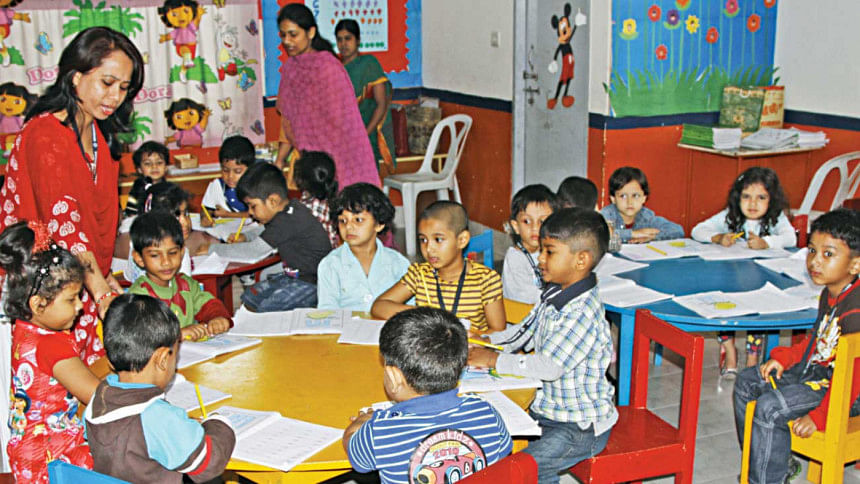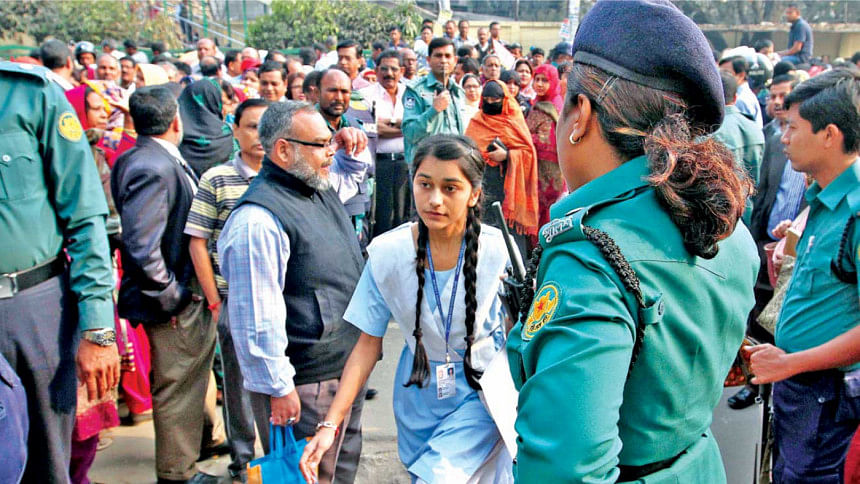DAMAGE CONTROL

school can be built in a matter of days, and already many students are starting to attend classes in existing schools. However, it is the long term damage that we should be concerned about," says Nurul Islam Nahid, Minister for the Ministry of Education in Bangladesh.
In the last few months, many government schools actually ran normally; students would attend classes and appear for class exams and tests. "The villages were not greatly affected by the blockades when it came to running schools," says Nurul Islam Nahid. "I witnessed the same in my constituency as well. But there are many other areas which were badly affected."

The loss suffered here, according to the Minister, is slowly being recovered. "We have devised plans and are confident that we can cover up this loss within 2-3 years. But the long term loss is actually a great deal, which sadly cannot be seen now. One will come to realise the loss maybe after a decade or more."

The total number of students in Bangladesh, starting from primary level to masters, including vocational, is about 6 crores. "I don't believe the number is the highest in the world," says Nahid. "The last few months have been a trauma for these students. They, along with their families, were constantly under pressure because of the hartals; will or will there not be class the next day? How safe is it to go to class? How to go? What if there is an accident on way to class? These students spent months in fear, which is why many of them are filled with negativity. And this will not end very soon."
The Minister also feels that the students have clearly lost their self confidence. "This will create a negative impact on the future for the students, when it comes to managing careers, practicing simple communication skills with others or opting for self development and skill development sessions," he says.
"The process to recover the loss will not end even in the next 50 years. We must realise that the next 40-50 years will be governed by the same students and young people who are traumatised and made to bear with such huge losses. These are the students who will make important decisions in the fields of agriculture, education, culture, national defence and so much more."
In a nutshell, Bangladesh has a wide range of young talents and ideas. Let us make use of these recourses, instead of shunning them to the corner of a room. It is after all, the duty of the people to build a strong generation of young people, encourage them to look towards the sky with valour and look in the eyes of fear.
As Robert Louis Stevenson had said - "Keep your fears to yourself, but share your courage with others."

THE RECOVERY PROCESS
Government school students all over the country need to catch up on the school work they have missed due to the hartals. An idea that the Ministry is working on by cutting down on holidays. "We will cut down on weekends; maybe go for just one day, instead of two," says Nurul Islam Nahid. "We will also have to cut down on summer vacations. We might not even have summer vacations this year or the next." Schools usually enjoy a full month of Ramadan holidays. The minister feels that even though he would not like to cut down on the holidays, he and his team might request the schools to use 10 days of the Ramadan holidays to cover up on missed lessons. "We will try this out for a year and see what happens," he says. "We need to be ready for all kinds of uncertainties."
All the government schools will be requested to take one extra class each day. "If the school day ends at 3 pm, the students might have to stay back for an hour more to study an extra class of Geography or Bengali," says Nahid.
The Ministry is also providing special training to the teachers and principals, so that the idea of covering up the lost lessons with extra classes and efforts can be drilled in. "We are providing this special training so that teachers and principals are motivated to do make-up work for their respective schools," he says. "There are some students who need more time and attention to catch up to their classmates. It is up to the teachers to make sure that all the students are attended to properly."
Yet another step that the ministry has taken is encouraging each school to recognise its unique problems and come up with solutions. Nurul Islam Nahid strongly believes that young people today are smarter than youngsters were even a decade ago. "This is because children are exposed to technology and global policies at a very young age," he says. "Undoubtedly, the young people in Bangladesh are very intelligent and quick to learn and adopt new methods."

 For all latest news, follow The Daily Star's Google News channel.
For all latest news, follow The Daily Star's Google News channel. 



Comments